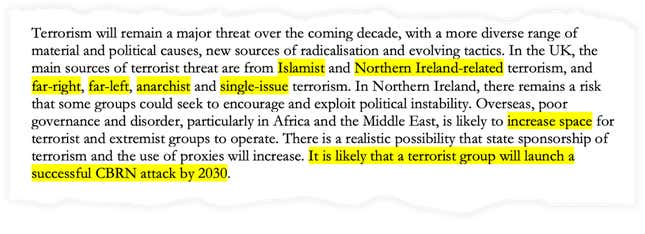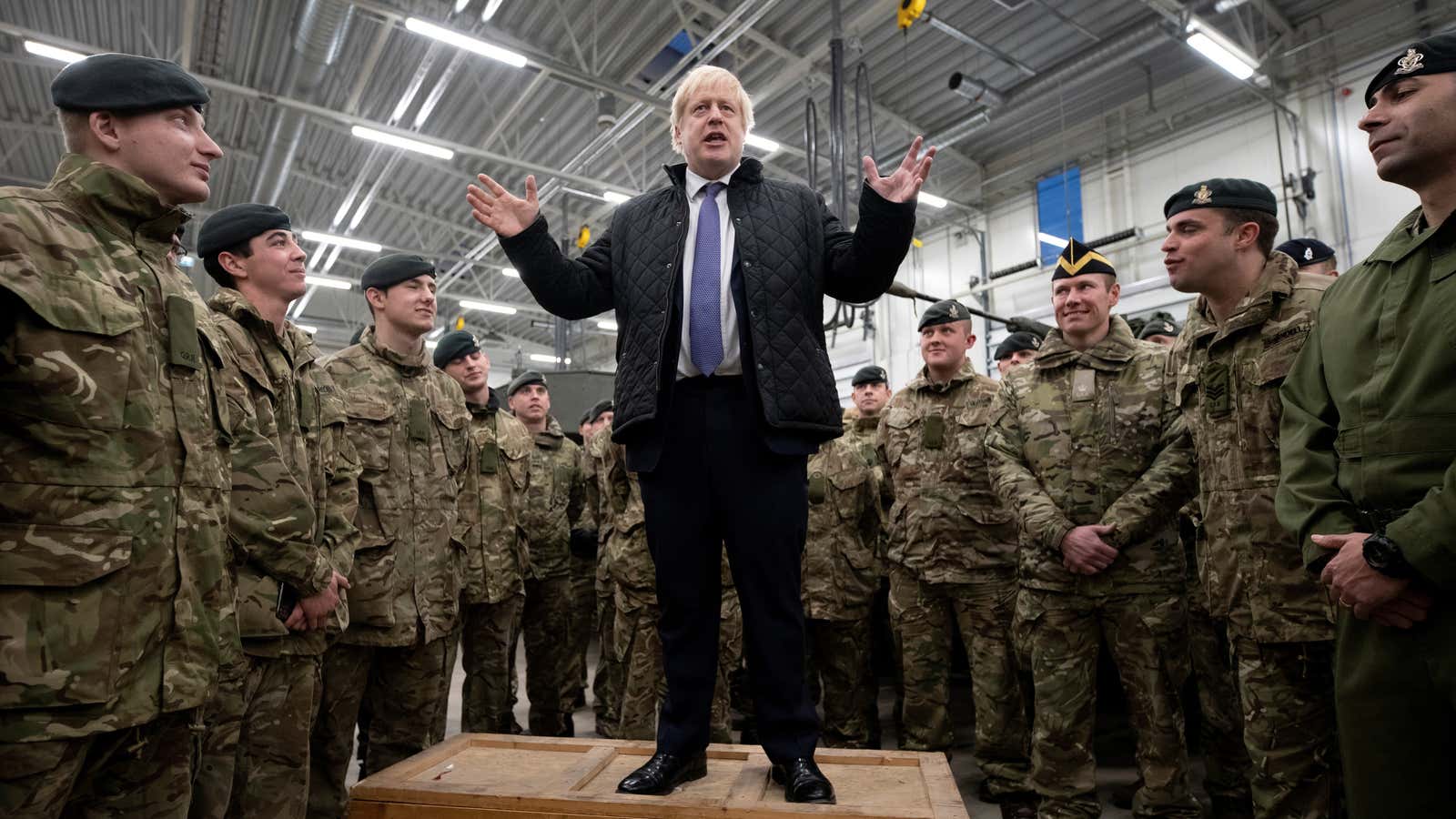The UK just released a roadmap, known as the Integrated Review, for its post-Brexit future.
Officially, it’s entitled “Global Britain in a Competitive Age,” and as far as policy papers go, this one is of the not-so-boring kind. The much-anticipated 100-page document outlines a vision for a leaner and meaner Britain by 2030—one that is more resilient to threats, more innovative, and more confident in defending its values at home and abroad.
It also warns Brits about the threats they will likely face in the next decade, from regular infectious disease outbreaks to more extreme weather events tied to climate change, and at least one successful terrorist attack.
“Having left the European Union, the UK has started a new chapter in our history,” writes prime minister Boris Johnson in the review’s foreword, according to a leaked copy seen by Quartz. “Few nations are better placed to navigate the challenges ahead, but we must be willing to change our approach and adapt to the new world emerging around us.”
What is the Integrated Review?
The Integrated Review is a future-looking audit of Britain’s defense, security, and foreign policy.
It was led by John Bew, a historian at King’s College London. Announced in 2019, it was delayed till March 2021 due to the pandemic. It’s likely to have been heavily influenced by Covid-19, which has made clear just how unprepared the world is for pandemics, and shone a light on potential threats from foreign powers like Russia and China.
Johnson presents the review to Parliament today (March 16) and you can watch it on Parliament TV around 12:30pm GMT. For the Brexiteer prime minister, who made the review part of his election campaign in 2019, it’s a chance to show those who voted for Brexit because they were told the UK would be free to shape its political future outside the confines of the European Union that they didn’t do so in vain.
The review is “an attempt to put meat on the bones of the ‘Global Britain’ concept,” says Raffaello Pantucci, a senior associate fellow on China and terrorism at the Royal United Services Institute (RUSI) think tank. “This was something the Tories banged on about a lot, this was something that Brexit was supposed to be all about, but no one has any idea what it means.”
It’s not the first iteration of an Integrated Review: according to the House of Commons library, “there has been at least one defense review in every decade since the 1950s, albeit at irregular intervals,” and the last major one (pdf) was published in 2015.
What does the Integrated Review say?
The review outlines commitments from the government to:
- Increase defense spending and contributions to NATO
- Equip Britain’s armed forces with new technologies
- Invest in scientific and military innovation
- Grow the UK’s police force and counter-terrorism units
- Become a “science and technology superpower” by 2030 by “attracting the world’s best and brightest” with a new visa
- Make “tackling climate change and biodiversity loss” the UK’s “number one international priority”
It also contains controversial announcements, such as:
- An increase in the UK’s stockpile of nuclear warheads from “no more than 225” to “no more than 260,” in spite of a 2010 commitment to get to “no more than 180 by the mid-2020s”
- A confirmation that previously announced cuts in the UK’s global aid budget will remain in place, though the review promises a “return to our commitment to spend 0.7% of gross national income on development when the fiscal situation allows”
The sections that will likely attract outsized attention focus on four different kinds of threats the UK will face over the next decade and how it can prepare for them. Some of the more striking ones include:
- “China’s increasing power and international assertiveness,” which is described as the “most significant geopolitical factor of the 2020s”
- An acceleration in the decline of “democracy and pluralism, accelerated by Covid-19”
- More infectious disease outbreaks

- A rise in biodiversity loss and extreme weather events tied to climate change, which could “amplify displacement and migration, and damage ecosystems,” while disproportionately affecting poor ad vulnerable people in sub-Saharan Africa, south and east Asia, and the Middle East
- A proliferation of chemical, biological, radiological, or nuclear (CBRN) weapons and “novel military technologies”
A key passage predicts that “it is likely that a terrorist group will launch a successful CBRN attack by 2030.”

“That’s a pretty bold statement but it reflects the reality that there is no reason to think that the underlying reasons that created the terrorist groups that have been bothering us for the past 20 years have been dealt with,” says RUSI’s Pantucci.
